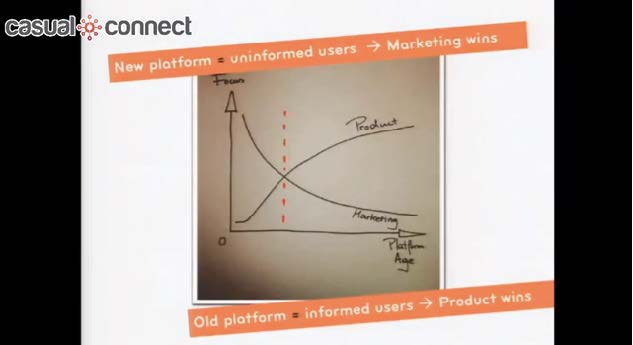Hitfox Group founder Jan Beckers addressed Casual Connect on the future of marketing mobile and online games. Beckers has founded six companies that currently employ over 500 people, primarily involved in marketing and advertising mobile games. The HitFox Group currently works with over 180 game publishers and over 1000 media partners.
Beckers kicked off his talk by noting the evolution of games, from 2005 when browser games began to be popular, Â to the growth of social games in 2007 through 2009, to then mobile games taking hold in a big way in 2010. Gamers were playing online and mobile games for the first time, and hadn’t really been exposed to many titles. “In early game marketing times untargeted banners, if you only bought your target cheap enough, worked rather well,” said Beckers. “That’s gone, of course.”
Today’s market is a very different story, Beckers said. “The good news is the market is still growing very fast and it will continue to grow,” said Beckers. “The problem today is the platforms are getting really crowded. There are so many developers out there competing for the same users. User acquisition became a bottleneck for everybody in the last few years. The advertising landscape became extremely complex.”
Beckers pointed out that there are many advertising models out there now, and that the market is beginning to enter a period of consolidation. “Game publishers will see more and more consolidation, with those getting out products to consumers with the smartest forms of advertising,” said Beckers. He outlined five of the key marketing trends that game publishers should keep an eye on in the coming years.
Strategic cross-promotion is important, and that means focusing on an audience and a genre of games rather than a platform to maximize the effectiveness of cross-promotion. “For the last few years, whenever there was a new platform coming out, such as social or mobile, it was rational to be a platform-focused player. That means a publisher considered themselves to be a mobile game publisher, a Facebook game publisher, or a browser game publisher.” When the platforms were all new, that made a lot of sense because the most critical knowledge was getting distribution and gameplay right on that platform. “Now the critical knowledge is of your audience and of a specific category of games, such as King with casual games,” said Beckers. “You must focus on a specific audience or genre in the future, and not so much on a specific platform. Every publisher will be a cross-platform publisher.”

Big data is the new holy grail for marketers. “The sophisticated advertisers are tracking nearly everything, and then they re-target only toward profitable groups of users,” said Beckers. Beyond that, the market is moving toward higher quality traffic, transitioning from CPM (the cost per one thousand impressions) to CPC (cost per click) to CPI (cost per install) and now towards ROI-optimized CPI. “Developers will pay out for users who complete a certain level,” said Beckers. “Pay more for quality traffic to get payers instead of only the players.”
Smart content integration is on the rise in the last few years, said Beckers. “Avoiding banners that look like banners, but providing actual value by integrating games in lists and by doing so you can reach out to classic media and new game media.” This way you get your games distributed in many blogs as well as being reviewed and mentioned, Beckers noted.
Finally, Beckers noted the importance of product. “In the long run marketing is helpful, but it’s about product, product, and the product,” said Beckers. Users are becoming educated and they know good games from bad games. “The product will do more and more of the marketing,” Becker contends. In an uninformed market, marketing wins, which is what happened in the early days of online, social and mobile games. Now as the market is becoming well-informed, marketing will help and it has to be done right — but game quality is essential if you want to maximize sales. “It’s very much about developing the best products in the future,” said Beckers. “I would recommend following the good examples of publishers that became cross-platform publishers but then stayed to one very precise target group. If you do the best product within the niche, that’s likely to pay out.”

